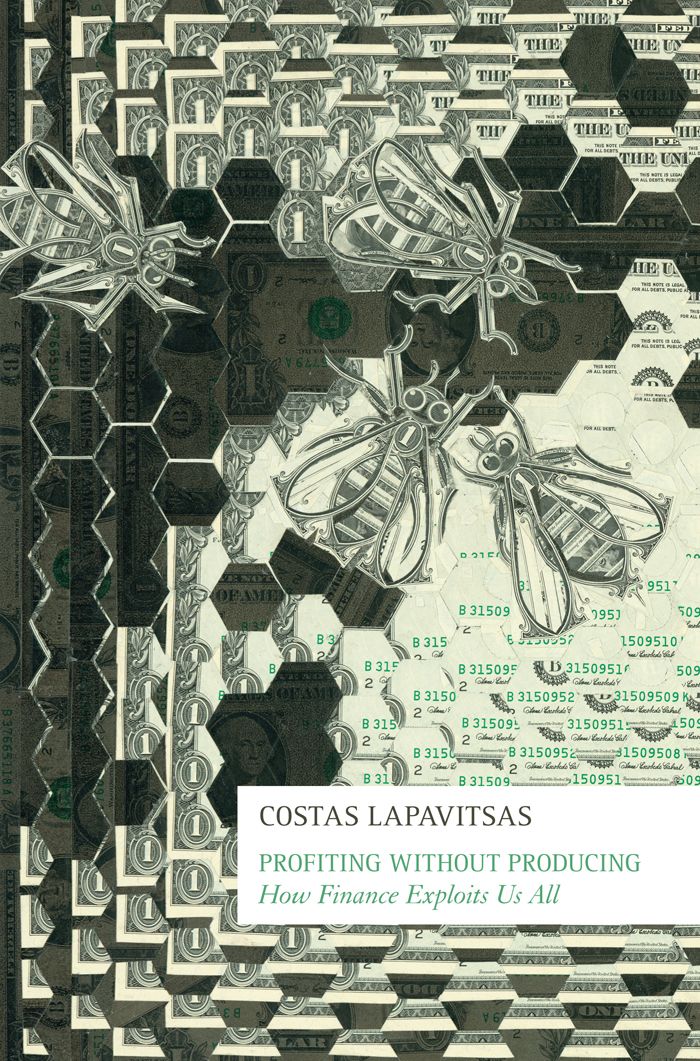Economics professor Costas Lapavitsas’ new book Profiting Without Producing: How Finance Exploits Us All, delving into the elusive world of finance, that place where fortunes are made seemingly out of nothing, but with such dramatic impact on the world economy. Lapavitsas tackles one of the most innovative and perhaps most controversial concepts in political economy: financialization. Aaron Leonard recently corresponded with professor Lapavitsas via email to ask him about his new book and its wider implications.
You write, “Considerable care is required not to lapse into treating finance as a parasitical or speculative set of activities, thus assigning to financialization a purely pathological character that would be misleading.” What exactly is financialization and what is the danger of simplistically dismissing it?
There is no generally agreed meaning to financialization. I understand it as a historic transformation of the capitalist economy — an epochal change that has taken place during the last four decades.
It would be a mistake to think of financialization as simply the incredible rise of finance, or the growth of speculative profits. Financialization is fundamentally about the transformation of industrial and commercial enterprises, seeking profit in financial activities; the transformation of banks, seeking profits in financial transactions and in dealing with households; the transformation, finally, of households, being sucked into the operations of finance to borrow but also to manage pensions and insurance. It represents a deep change of economic but also social life, affecting even ethics and morality.
What did financialization have to do with the economic crisis of 2007-2008 — or to put another way — why should we be concerned about financialization today?
The crisis of 2007-2009 is a systemic crisis of financialized capitalism. Think about it: a vast global crisis broke out because U.S. financial businesses had made bad loans to the poorest section of the U.S. working class. Such a development would have been unthinkable in the 19th century.
Needless to say, real capitalist accumulation has been in serious difficulty for a long time and profitability, though it has recovered, remains weak by the standards of the 1960s. This is the background against which financialization has produced a succession of bubbles which seriously affect the real economy when they burst.
There is a passage that especially caught my attention: “The autumn of U.S. hegemony, whether due to financialization or not, has coincided with substantial inflows to the U.S., including remarkably, from some of the poorest countries of the world.” This seems quite a paradox. Could you expand?
This is indeed one of the major paradoxes of financialization. The global growth of finance has been predicated upon the role of the dollar as the international reserve currency — the closest things that exists to a world money today. Developing countries, mostly China, but even some of the poorest countries in the world have been hoarding dollars to be able to participate in the world market. Dollars are hoarded by buying U.S. government bonds, that is, by sending capital to the U.S. The result is that, on a net basis, the U.S. has been receiving capital from the rest of the world, not exporting it.
This is a vast privilege that allows the U.S. to cheaply finance its government. Developing countries, meanwhile, are led to financialize their economies as they acquire very liquid U.S. assets.
In the conclusion you write, “Confronting financialization is inherently a stance that leads to anti-capitalist ideas, policies and practices.” Why is this so, rather than for a example, a model of regulating finance, toward more balance, i.e. a more Keynesian world where the economy is regulated toward the interests of full-employment and all that brings?
Financialization is a historic change, a deep transformation of mature and developing capitalist economies. It is not merely the result of policy changes, such as financial liberalization, though they have certainly contributed to it. It follows that financialization cannot be confronted by simply regulating finance, or effecting policy changes at the macroeconomic level. Naturally, these should take place to restrain finance but a lot more is required to reverse financialization.
To be more specific, the operations of industrial and commercial enterprise would have to be distanced from finance; there would have to be public ownership and control over banks; there would also have to be restored public provision of housing, education, health and pensions to take finance out of the lives of individual workers. These are deep changes in economy and society that would move the balance of power against capital and in favour of labour.
Related to that, why is it, in your view, socialism — if I understand what you write correctly — then the actual alternative?
The struggle to reverse financialization is part and parcel of the struggle to achieve socialism. It is not necessary to achieve socialism in order to reverse financialization, indeed achieving socialism is a far more complex issue. But fighting to restrain finance and to remove its influence from everyday life is a vital part of the fight for socialism. This is precisely the kind of socialism that we need for the 21st century — associational, communal, democratic and innovative in dealing with social problems by financialized capitalism.
Costas Lapavitsas is a Professor of Economics at the School of Oriental and African Studies, University of London. He is a member of Research on Money and Finance (RMF). He is the lead author of the new RMF report “Breaking Up? A Route Out of the Eurozone Crisis.” His previous publications include Social Foundations of Markets, Money and Credit and Political Economy of Money and Finance.



